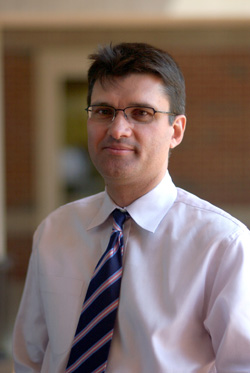CSC News
Rouskas Receives Major NSF Award to Study Computing Across Curricula
 Dr. George Rouskas, professor of computer science at NC State University, has been awarded $258,749 by the National Science Foundation to fund his research proposal titled “CPATH CB: Computing Across Curricula.”
Dr. George Rouskas, professor of computer science at NC State University, has been awarded $258,749 by the National Science Foundation to fund his research proposal titled “CPATH CB: Computing Across Curricula.” Co-PIs on the proposal include: Lisa Bullard, Jeffrey Joines, Lawrence Silverberg, and Eric Wiebe.
Senior personnel who are integral to the effort and who will be heavily involved in the work include: Carol Miller, Amy Craig (CoE Coordinator of Student-Owned Computing) and Dianne Raubenheimer (CoE Director of Assessment).
The award will run from July 1, 2007 through June 30, 2010.
Research Abstract - The primary focus of this project is to streamline pathways through which students receive an education that equips them with the computing tools necessary for them to serve as future computing leaders of society. Ultimately, the proposed activities are designed to make the computing education more relevant to the ever-changing needs of the computing workforce in the United States. To achieve these objectives, the institution proposes assembling a community of individuals, each of whom is invested in their own unique way to revitalizing the undergraduate computing education. The community will involve faculty representatives from several academic departments, faculty from CISE disciplines, and delegates from industry partner organizations.
Faculty learning communities are nothing new to academe. The goal of the efforts proposed here is to put a new twist on a proven faculty collaboration method. To date, many learning communities have been limited to faculty involvement only, and involvement from engineering faculty in these formal university-wide communities has been somewhat disappointing. Although, these university communities can be an effective means of addressing many issues pertinent to education, the proposed activities seek to encourage a variety of key computing stakeholders outside of the university to participate. The community created would partner with local industry leaders to open up meaningful channels for dialogue to flow from industry to the university. The community seeks to view industry partners as customers so that university educators can perform a needs-assessment by which the computing skills relevant to today's computing professionals are determined. Faculty can then translate these needs into their respective curricula in order to create a diverse, flexible education that will result in a diverse, flexible workforce of computing professionals.
Return To News Homepage